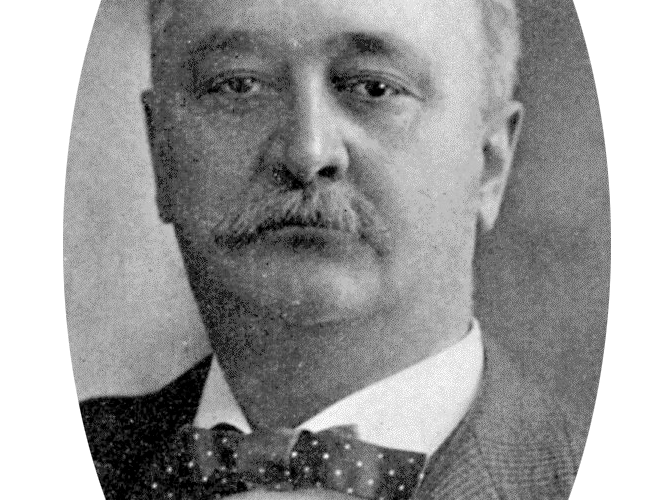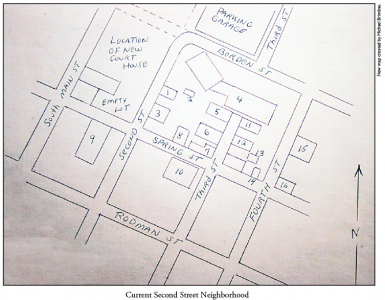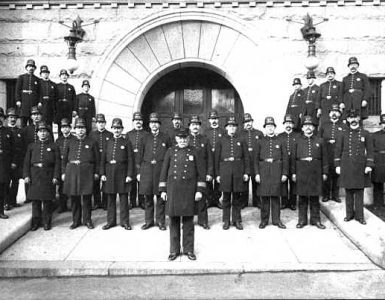by Harry Widdows
First published in June/July, 2004, Volume 1, Issue 3, The Hatchet: Journal of Lizzie Borden Studies.
While thumbing through a book titled The Torture Doctor on the late 1800s Chicago serial killer, H.H. Holmes, I ran across a name familiar to serious Bordenphiles, that of the detective hired by the Borden defense, Orinton M. Hanscom.
H. H. Holmes, perhaps one of the most prolific serial killers, was arrested on November 17, 1894 in Boston, Massachusetts, not on a murder charge, but on a Texas warrant for “Larceny of one horse.” It was also known that Holmes was wanted on a warrant from Philadelphia for insurance fraud. While in the custody of the Boston police, Holmes underwent questioning by then Deputy Superintendent of Police Hanscom. Nothing suspicious about Holmes was uncovered and on November 20th Holmes pleaded guilty to the Philadelphia warrant and was turned over to Philadelphia police. Hanscom would later testify at Holmes’ murder trial in October 1895, describing Holmes’ arrest in Boston [1].
This incident led me to pursue what further information I could find on Hanscom. In April, I wrote to the Boston Police Department requesting information on his career and was directed to Ms. Donna M. Wells, Records Manager and Archivist. Ms. Wells was kind enough to supply me with additional information as well as a photo of Hanscom. Before revealing the details of this information let’s briefly review Hanscom’s involvement in the Borden case.
The Pinkerton Agent
At the time of the Borden murders in 1892, Orinton Hanscom was Superintendent of the Pinkerton Detective Agency in Boston. He was hired by Lizzie and Emma Borden at the suggestion of their attorney, Andrew J. Jennings, and arrived in Fall River on Saturday, August 6th.
The Fall River police immediately suspected that Hanscom was hired to protect the Borden sisters from them and his presence was deeply resented. Along with Jennings, Hanscom was suspected of placing hindrances in the way of their investigation.
On August 14th, Robert Pinkerton, head of the Pinkerton company, in an article carried in the Fall River Herald, announced that at his suggestion Hanscom had withdrawn from the case, with the continuing hostility of the police being cited as the reason. In that article, Pinkerton claimed that Hanscom was “hired by the family to follow any clues that might lead to the detection of the criminal” [2].
The August 14th date however is at odds with an article that appeared in a Hastings, Iowa paper dated August 19, 1892. The article, in part, contained the following: “While Morse has succeeded in establishing a very fair alibi, it seems that Lizzie Borden, who is now under arrest for the murder, is anxious to know something of his past record. She has accordingly sent Detective Hanscom out here to investigate” [3].
Exactly how long Hanscom was in the employ of the defense and what his findings were are not known as no records have ever been revealed.
We do know that Hanscom was at the Borden house on Sunday the 7th and accompanied Jennings during the police search of the house on Monday the 8th. It was then that he interviewed Lizzie, Emma, and Alice Russell. According to Emma, Alice told Hanscom a “falsehood” that all of Lizzie’s dresses were accounted for that were there the day of the tragedy. When Alice told Lizzie and Emma that she was questioned about Lizzie’s dresses and had lied, Emma and Lizzie had Alice return to Hanscom and tell him of the missing dress. Whether or not Alice told him that Lizzie had burned a dress cannot be definitely established from the primary documents, though it would seem likely.
Hanscom’s involvement with the case seems to have suddenly ended, except for the above mentioned newspaper reference about his trip to Iowa to investigate Morse.
The Boston Police Department
Orinton M. Hanscom was born in 1846 in Oxford, Maine. Although only 14 years of age at the beginning of the Civil War and 19 at its end, he served on the Union side.
He was appointed to the Boston Police Department in 1873 at the age of 26. His prior occupation was listed as carpenter [4].
He appears to have been a steady and effective officer and it is shown from official Police Department records that Hanscom received a number of cash rewards for arrests made. At the September 18, 1886 meeting of the Board of Police Commissioners, Hanscom was promoted to Chief Inspector of the Police Force of the City of Boston [5].
Again official records cite him as being an effective official. Then, an entry in July 1888 brings out startling charges and the end of his police career. The following is printed as it appears in the official police records:
Thursday, July 5, 1888 – A meeting of the Board of Police Commissioners was held this day all the members being present.
The Board transacted the following business:
. . . In the matter of the complaint against Orinton M. Hanscom, Chief Inspector of Police made by Cyrus Small, Superintendent of Police for the city of Boston, for violation of Rule One-hundred and eleven (111) of the Police Manual, to wit: –
1st. Insubordination and disrespect to his superior officers by aiding and encouraging the publication of articles in the newspapers at divers times between the first day of December, 1887, and the first day of May, 1888, which were disrespectful in tone and intended to bring his superior officers into contempt.
2nd. By allowing his office to be used for the preparation of such articles for publication.
3rd. By speaking disrespectfully of his superior officers in a public place on the 8th day of February 1888, and at divers other times.
4th. Immoral conduct: In that the said Chief Inspector Hanscom, he being a married man, did on the 23rd day of October, 1887, and on the 11th day of January, 1888, and at divers other times, take a woman whose name is unknown to complainant to rooms marked “Private” and numbered “9” and “10” up two flights in building numbered “7” Pemberton Square [this was the address of police headquarters in 1888], and remaining there with her at one time one and one-half hours and by so doing bringing scandal and disgrace on the Police Department.
Violation of Rule 153.
By falsely stating to the Superintendent that he had employed a man named “Smith” to aid in convicting criminals by going to the County Jail, Charles street, several times daily for the purpose of obtaining evidence against Adam Cliff, and others who were arrested on the 13th day of January, 1888.
Violation of Rule 111.
By presenting a false bill amounting to the sum of $236.50 and fraudulently obtaining the money for the same, representing that it was to pay the said man named “Smith” when in fact no person named Smith was employed and no such visits were made to the jail by Smith or any other person.
It appeared that a hearing was had after there had been proper notice served on the said Orinton M. Hanscom by giving him a true and attested copy of the charges and specifications and at ten o’clock A.M. on the 31st day of May, A.D. 1888, the day set for the hearing, the said Orinton M. Hanscom appeared by himself and counsel, and pleaded not guilty to the charges. And upon the evidence presented the Board finds and adjudges the said Orinton M. Hanscom guilty of Insubordination and Disrespect towards his Superior Officers as set out in articles one and two under the charges of violation of Rule One-hundred and eleven (111).
It was Voted:
That Chief Inspector Orinton M. Hanscom be dismissed from the Police Force of the City of Boston and he is accordingly hereby dismissed.
The Board further finds in references to the balance of the charges set out in the complaint, that they are not sustained by the evidence . . .” [6]
Sometime after his dismissal from the Police, Hanscom joined the Pinkerton Detective Agency in Boston and rose to the rank of Superintendent of the Boston office. It was during this period that he became involved in the Borden case.
Then, in 1894, a surprising turn of events took place and Hanscom was reappointed to the Boston Police Department. Citing official transcripts of the Board of Police Commissioners:
Saturday, July 7, 1894 – A meeting of the Board of Police Commissioners was held this day all the members being present.
The Board transacted the following business:
Saturday, July 7, 1894 (con’t)
It was Voted:
That the Board of Civil Service Commissioners be requested to certify Orinton M. Hanscom, a veteran of the war of the rebellion and formerly chief inspector of police in this city for appointment as deputy superintendent of police.
Passed: Commissioner A. T. Whiting dissenting.
The Board of Civil Service Commissioners having certified that Orinton M. Hanscom, an honorably discharged veteran of the war of the rebellion, had complied with all the requirements of the law, was eligible for appointment as deputy superintendent of police, it was
Voted:
That Orinton M. Hanscom be and hereby is appointed a deputy superintendent in the police force.
Passed: Commissioner A.T. Whiting dissenting . . .” [7]
What the circumstances were that allowed his reinstatement to the Police Force are not known, but it should be noted that Commissioner Whiting, the dissenting member, was on the original commission that dismissed Hanscom.
Hanscom’s second career with the police seems to have been uneventful.
Throughout 1907 there are several entries authorizing payments to Hanscom for salary earned while absent because of sickness. Hanscom died on November 7, 1907. Official records cite the following:
Friday, November 8, 1907 – Police Commissioner O’Meara was at his office today and transacted the following business:
The records of yesterday were read and approved.
The Superintendent of Police was directed to promulgate the following to the Department by General Order:
The death of Deputy Superintendent Orinton M. Hanscom is announced officially to the Department. It took place Thursday, November 7, as the result of a disease from which he had suffered for six months.
Deputy Superintendent Hanscom was born July 19, 1846, and notwithstanding his extreme youth performed a soldier’s full duty in the Civil War. He was appointed to the Boston Police Force April 28, 1873, served afterwards with energy and intelligence as Inspector and Chief Inspector, and for the past thirteen years in the important position held by him at the time of his death. He was known to a large part of the public as well as to the members of the Department not only for his ability as a public officer but for his amiable and attractive personal qualities.
In recognition of his character and services as well as of his rank, the Superintendent will direct that the Department shall be represented at the funeral of Deputy Superintendent Hanscom in such manner and to as great an extent as shall be acceptable to his family [8].
At the time of his death his wife, Kate K. Hanscom, survived him.
The little that we know of Orinton M. Hanscom presents him as a complex personality who experienced major career setbacks and equally major career rebirths. His involvement in the Borden murders makes his life’s story even more intriguing and one can only hope that additional information will one day be brought to light that will enable us to further understand Hanscom’s duties and responsibilities in this case. Perhaps further investigation will finally reveal the Pinkerton’s work for the Borden sisters and shed some light on the Morse/Iowa investigation as well.
FOOTNOTES:
1 The Torture Doctor, David Franke, NY: Avon Books, 1975.
2 Len Rebello, Lizzie Borden: Past & Present, Leonard Rebello, Al-Zach Press, Fall River, MA, 1999: 119.
3 New Bedford Evening Standard, “The Fall River Murders,” August 19, 1892: 1.
4 Private e-mail from Ms. Donna M. Wells, Records Manager and Archivist, Boston Police Department Records Center, Hyde Park, MA.
5 Records of the Police Commissioners, Series 1, September 18, 1886.
6 Records of the Police Commissioners, Series 1, July 5, 1888.
7 Records of the Police Commissioners, Series 1, July 7, 1894.
8 Records of the Police Commissioners, Series 1, November 8, 1907.






